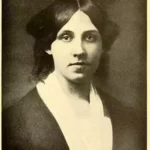 | |
The King of Clubs and the Queen of Hearts | |
| Author | Louisa May Alcott |
|---|---|
| Published |
1855
|
| Language | English |
| Nationality | American |
| Genre | Children's Literature, Domestic Fiction |
1855 Short Story
The King of Clubs and the Queen of Hearts
The King of Clubs and the Queen of Hearts is an English Children's Literature, Domestic Fiction short story by American writer Louisa May Alcott. It was first published in 1855.
The King of Clubs and the Queen of Hearts
by Louisa May Alcott
Five and twenty ladies, all in a row, sat on one side of the hall, looking very much as if they felt like the little old woman who fell asleep on the king’s highway and awoke with abbreviated drapery, for they were all arrayed in gray tunics and Turkish continuations, profusely adorned with many-colored trimmings. Five and twenty gentleman, all in a row, sat on the opposite side of the hall, looking somewhat subdued, as men are apt to do when they fancy they are in danger of making fools of themselves. They, also, were en costume, for all the dark ones had grown piratical in red shirts, the light ones nautical in blue; and a few boldly appeared in white, making up in starch and studs what they lost in color, while all were more or less Byronic as to collar.
On the platform appeared a pile of dumb-bells, a regiment of clubs, and a pyramid of bean-bags, and stirring nervously among them a foreign-looking gentleman, the new leader of a class lately formed by Dr. Thor Turner, whose mission it was to strengthen the world’s spine, and convert it to a belief in air and exercise, by setting it to balancing its poles and spinning merrily, while enjoying the “Sun-cure” on a large scale. His advent formed an epoch in the history of the town; for it was a quiet old village, guiltless of bustle, fashion, or parade, where each man stood for what he was; and, being a sagacious set, every one’s true value was pretty accurately known. It was a neighborly town, with gossip enough to stir the social atmosphere with small gusts of interest or wonder, yet do no harm. A sensible, free-and-easy town, for the wisest man in it wore the worst boots, and no one thought the less of his understanding; the belle of the village went shopping with a big sun-bonnet and tin pail, and no one found her beauty lessened; oddities of all sorts ambled peacefully about on their various hobbies, and no one suggested the expediency of a trip on the wooden horse upon which the chivalrous South is always eager to mount an irrepressible abolitionist. Restless people were soothed by the lullaby the river sang in its slow journey to the sea, old people found here a pleasant place to make ready to die in, young people to survey the world from, before taking their first flight, and strangers looked back upon it, as a quiet nook full of ancient legends and modern lights, which would keep its memory green when many a gayer spot was quite forgotten. Anything based upon common sense found favor with the inhabitants, and Dr. Turner’s theories, being eminently so, were accepted at once and energetically carried out. A sort of heathen revival took place, for even the ministers and deacons turned Musclemen; old ladies tossed bean-bags till their caps were awry, and winter roses blossomed on their cheeks; school-children proved the worth of the old proverb, “An ounce of prevention is worth a pound of cure,” by getting their backs ready before the burdens came; pale girls grew blithe and strong swinging their dumb namesakes; and jolly lads marched to and fro embracing clubs as if longevity were corked up in those wooden bottles, and they all took “modest quenchers” by the way.
August Bopp, the new leader of the class, was a German possessing but a small stock of English, though a fine gynmast; and, being also a bashful man, the appointed moment had no sooner arrived than he found his carefully prepared sentences slipping away from his memory as the ice appears to do from under unhappy souls first mounted upon skates. An awful silence reigned; Mr. Bopp glanced nervously over his shoulder at the staring rows, more appalling in their stillness than if they had risen up and hooted at him, then piling up the bags for the seventh time, he gave himself a mental shake, and, with a crimson visage, was about to launch his first “Ladees und gentlemen,” when the door opened, and a small, merry-faced figure appeared, looking quite at ease in the novel dress, as, with a comprehensive nod, it marched straight across the hall to its place among the weaker vessels.
A general glance of approbation followed from the gentlemen’s side, a welcoming murmur ran along the ladies’, and the fifty pairs of eyes changed their focus for a moment. Taking advantage of which, Mr. Bopp righted himself, and burst out with a decided,–
“Ladees und gentlemen: the time have arrived that we shall begin. Will the gentlemen serve the ladees to a wand, each one, then spread theirselves about the hall, and follow the motions I will make as I shall count.”
Five minutes of chaos, then all fell into order, and nothing was heard but the leader’s voice and the stir of many bodies moving simultaneously. An uninitiated observer would have thought himself in Bedlam; for as the evening wore on, the laws of society seemed given to the winds, and humanity gone mad. Bags flew in all directions, clubs hurtled through the air, and dumb-bells played a castinet accompaniment to peals of laughter that made better music than any band. Old and young gave themselves up to the universal merriment, and, setting dignity aside, played like happy-hearted children for an hour. Stout Dr. Quackenboss gasped twice round the hall on one toe; stately Mrs. Primmins ran like a girl of fifteen to get her pins home before her competitor; Tommy Inches, four feet three, trotted away with Deacon Stone on his shoulder, while Mr. Steepleton and Miss Maypole hopped together like a pair of lively young ostriches, and Ned Amandine, the village beau, blew arrows through a pop-gun, like a modern Cupid in pegtops instead of pinions.
The sprightly young lady whose entrance had been so opportune seemed a universal favorite, and was overwhelmed with invitations to “bag,” “hop,” and “blow” from the gentlemen who hovered about her, cheerfully distorting themselves to the verge of dislocation in order to win a glance of approbation from the merry black eyes which were the tapers where all these muscular moths singed their wings. Mr. Bopp had never seen such a little piece of earnestness before, and began to think the young lady must be training for a boat-race or the ring. Her dumb-bells flew about till a pair of white arms looked like the sails of a windmill; she hit out from the shoulder with a vigor that would have done execution had there been anything but empty air to “punish;” and the “one, two, three!” of the Zouave movement went off with a snap; while the color deepened from pink to scarlet in her cheeks, the black braids tumbled down upon her shoulders, and the clasp of her belt flew asunder; but her eye seldom left the leader’s face, and she followed every motion with an agility and precision quite inspiring. Mr. Bopp’s courage rose as he watched her, and a burning desire to excel took possession of him, till he felt as if his muscles were made of India-rubber, and his nerves of iron. He went into his work heart and soul, shaking a brown mane out of his eyes, issuing commands like general at the head of his troops, and keeping both interest and fun in full blast till people laughed who had not laughed heartily for years; lungs got their fill for once, unsuspected muscles were suddenly developed, and, when the clock struck ten, all were bubbling over with that innocent jollity which makes youth worth possessing, and its memory the sunshine of old age.
The last exercise was drawing to a close, and a large ring of respectable members of society were violently sitting down and rising up in a manner which would have scandalized Miss Wilhelmina Carolina Amelia S. Keggs to the last degree, when Mr. Bopp was seen to grow very pale, and drop in a manner which it was evident his pupils were not expected to follow.
At this unexpected performance, the gentlemen took advantage of their newly-acquired agility to fly over all obstacles and swarm on to the platform, while the ladies successfully lessened their unusual bloom by staring wildly at one another and suggesting awful impossibilities. The bustle subsided, as suddenly as it arose; and Mr. Bopp, rather damp about the head and dizzy about the eye, but quite composed, appeared, saying, with the broken English and appealing manner which caused all the ladies to pronounce him “a dear” on the spot,–
“I hope you will excoose me for making this lesson to be more short than it should; but I have exercise nine hours this day, and being just got well from a illness, I have not recover the strength I have lost. Next week I shall be able to take time by the hair, so that I will not have so much engagements in one day. I thank you for your kindness, and say good-efening.”
After a round of applause, as a last vent for their spirits, the class dispersed, and Mr. Bopp was wrestling with a vicious pin as he put on his collar (“a sure sign he has no ma to see to his buttons, poor lamb!” thought Mrs. Fairbairn, watching him from afar); when the sprightly young lady, accompanied by a lad the masculine image of herself, appeared upon the platform, saying, with an aspect as cordial as her words,–
“Good-evening, Professor. Allow me to introduce my brother and myself, Dick and Dolly Ward, and ask you in my mother’s name, to come home with us; for the tavern is not a cosy place, and after all this exertion you should be made comfortable. Please come, for Dr. Turner always stayed with us, and we promised to do the honors of the town to any gentleman he might send to supply his place.”
“Of course we did; and mother is probably freezing her blessed nose off watching for us; so don’t disappoint her, Bopp. It’s all settled, the sleigh’s at the door, and here’s your coat; so, come on!”
Dick was a fine sample of young America in its best aspect, and would have said “How are you?” to Louis Napoleon if he had been at hand, and have done it so heartily that the great Frenchman would have found it hard to resist giving as frank an answer. Therefore no wonder that Mr. Bopp surrendered at once; for the young gentleman took possession of him bodily, and shook him into his coat with an amiable impetuosity which developed a sudden rent in the well-worn sleeve thereof, and caused an expression of dismay, to dawn upon the owner’s countenance.
“Beg pardon; never mind; mother’ll sew you up in two seconds, and your overcoat will hide the damage. Where is it? I’ll get it, and then we’ll be off.”
Mr. Bopp colored distressfully, looked up, looked down, and then straight into the lad’s face, saying simply,–
“Thank you; I haf no coat but one.”
Dick opened his eyes, and was about opening his mouth also, for the exit of some blunderingly good-natured reply, when a warning poke from his sister restrained him, while Dolly, with the innocent hypocrisy which is as natural to some women as the art of tying bows, said, as she led the way out,–
“You see the worth of gymnastics, Dick, in this delightful indifference to cold. I sincerely hope we may reach a like enviable state of health, and look upon great-coats as effeminate, and mufflers a weakness of the flesh. Do you think we shall, Mr. Bopp?”
He shook his head with a perceptible shiver as the keen north wind smote him in the face, but answered, with a look half merry, half sad,–
“It is not choice, but what you call necessitee, with me; and I truly hope you may never haf to exercise to keep life in you when you haf sold your coat to pay a doctor’s bill, or teach the art of laughing while your heart is heavy as one stone. You would not like that, I think, yet it is good, too; for small things make much happiness for me, and a kind word is often better than a rix dollar.”
There was something in the young man’s tone and manner which touched and won his hearers at once. Dolly secretly resolved to put an extra blanket on his bed, and shower kind words upon him, while Dick tucked him up in buffalo robes where he sat helplessly beaming down upon the red hood at his side.
A roaring fire shone out hospitably as they came, and glorified the pleasant room, dancing on ancient furniture and pictured walls till the jolly old portraits seemed to wink a visible welcome. A cheery-faced little woman, like an elder Dolly, in a widow’s cap, stood on the threshold, with a friendly greeting for the stranger, which warmed him as no fine could have done.
If August Bopp had been an Englishman, he would have felt much, but said less on that account; if he had been an American, he would have tried to conceal his poverty, and impress the family with his past grandeur, present importance, or future prospects; being a German, he showed exactly what he was, with the childlike frankness of his race. Having had no dinner, he ate heartily of what was offered him; being cold, he basked in the generous warmth; being homesick and solitary, he enjoyed the genial influences that surrounded him, and told his story, sure of sympathy; for even in prosaic Yankeedom he had found it, as travellers find Alpine flowers among the snow.
It was a simple story of a laborious boyhood, being early left an orphan, with a little sister dependent on him, till an opening in America tempted him to leave her and come to try and earn a home for her and for himself. Sickness, misfortune, and disappointment had been his companions for a year; but he still worked, still hoped, and waited for the happy hour when little Ulla should come to him across the sea. This was all; yet as he told it, with the magical accompaniments of gesture, look, and tone, it seemed full of pathos and romance to his listeners, whose faces proved their interest more flatteringly than their words.
Mrs. Ward mended the torn coat with motherly zeal, and gave it many of those timely stitches which thrifty women love to sew. The twins devoted themselves to their guest, each in a characteristic manner. Dick, as host, offered every article of refreshment the house afforded, goaded the fire to a perpetual roar, and discussed gymnastics, with bursts of boyish admiration for the grace and skill of his new leader, whom he christened King of Clubs on the spot. Dolly made the stranger one of them at once by talking bad German, as an offset to his bad English, called him Professor in spite of all denials, and unconsciously symbolized his future bondage by giving him a tangled skein to hold for the furtherance of her mother’s somewhat lengthened job.
The Cupid of the present day was undoubtedly “raised” in Connecticut; for the ingenuity and shrewdness of that small personage could have sprung from no other soil. In former times his stratagems were of the romantic order. Colin bleated forth his passion in rhyme, and cast sheep’s eyes from among his flock, while Phyllis coquetted with her crook and stuck posies in his hat; royal Ferdinand and Miranda played at chess; Ivanhoe upset his fellow-men like ninepins for love of lackadaisical Rowena; and “sweet Moll” turned the pages while her lover, Milton, sang. But in our day the jolly little god, though still a heathen in the severe simplicity of his attire, has become modernized in his arts, and invented huskings, apple-bees, sleigh-rides, “drop-ins,” gymnastics, and, among his finer snares, the putting on of skates, drawing of patterns, and holding skeins,–the last-named having superior advantages over the others, as all will testify who have enjoyed one of those hand-to-hand skirmishes.
August Bopp was three and twenty, imaginative, grateful, and heart-whole; therefore, when he found himself sitting opposite a blooming little damsel, with a head, bound by a pretty red snood, bent down before him, and very close to his own a pair of distracting hands, every finger of which had a hit to make, and made it, it is not to be denied that he felt himself entering upon a new and very agreeable experience. Where could he look but in the face opposite, sometimes so girlishly merry and sometimes so beautifully shy? It was a winning face, full of smooth curves, fresh colors, and sunshiny twinkles,–a face every one liked, for it was as changeful as an April day, and always pleasant, whether mischievous, mournful, or demure.
Like one watching a new picture, Mr. Bopp inspected every feature of the countenance so near his own; and, as his admiration “grew by what it fed on,” he fell into a chronic state of stammer and blush; for the frank eyes were very kind, the smooth cheeks reflected a pretty shade of his own crimson, and the smiling lips seemed constantly suggesting, with mute eloquence, that they were made for kissing, while the expressive hands picked at the knots till the Professor felt like a very resigned fly in the web of a most enticing young spider.
If the King of Clubs saw a comely face, the Queen of Hearts saw what observing girls call a “good face;” and with a womanly respect for strength, the manliest attribute of man, she admired the broad shoulders and six feet one of her new master. This face was not handsome, for, true to his fatherland, the Professor had an eminent nose, a blonde beard, and a crop of “bonny brown hair” long enough to have been gathered into a ribbon, as in the days of Schiller and Jean Paul; but Dolly liked it, for its strength was tempered with gentleness; patience and courage gave it dignity, and the glance that met her own was both keen and kind.
The silk was wound at last, the coat repaired. Dick with difficulty concealed the growing stiffness of his shoulders, while Dolly turned up the lamp, which bluntly hinted bedtime, and Mrs. Ward successfully devoured six gapes behind her hand, but was detected in the seventh by Mr. Bopp, who glanced at the clock, stopped in the middle of a sentence, and, with a hurried “goot-night,” made for the door without the least idea whither he was going. Piloted by Dick, he was installed in the “best chamber,” where his waking dreams were enlivened by a great fire, and his sleeping ones by an endless succession of skeins, each rapturously concluded in the style of Sam Weller when folding carpets with the pretty maid.
“I tell you, Dolly, it won’t do, and I’m not going to have it.”
“Oh, indeed; and how will you help it, you absurd boy?”
“Why, if you don’t stop it, I’ll just say to Bopp,–‘Look here, my dear fellow; this sister of mine is a capital girl, but she will flirt and'”–
“And it’s a family failing, Dick,” cut in Dolly.
“Not a bit of it. I shall say, ‘Take care of your heart, Bopp, for she has a bad habit of playing battle-door and shuttle-cock with these articles; and, though it may be very good fun for a time, it makes them ache when they get a last knock and are left to lie in a corner.'”
“What eloquence! But you’d never dare to try it on Mr. Bopp; and I shouldn’t like to predict what would happen to you if you did.”
“If you say ‘dare,’ I’ll do it the first minute I see him. As for consequences, I don’t care that for ’em;” and Dick snapped his fingers with an aspect of much disdain. But something in his sister’s face suggested the wisdom of moderation, and moved him to say, less like a lord of creation, and more like a brother who privately adored his sister, but of course was not going to acknowledge such a weakness,–
“Well, but soberly, now, I wish you wouldn’t plague Bopp; for it’s evident to me that he is hit; and from the way you’ve gone on these two months, what else was to be expected? Now, as the head of the family,–you needn’t laugh, for I am,–I think I ought to interfere; and so I put it to you,–do you like him, and will you have him? or are you merely amusing yourself, as you have done ever since you were out of pinafores? If you like him, all serene. I’d rather have him for a brother than any one I know, for he’s a regular trump though he is poor; but if you don’t, I won’t have the dear old fellow floored just because you like to see it done.”
It may here be remarked that Dolly quite glowed to hear her brother praise Mr. Bopp, and that she indorsed every word with mental additions of double warmth; but Dick had begun all wrong, and, manlike, demanded her confidence before she had made up her mind to own she had any to bestow; therefore nothing came of it but vexation of spirit; for it is a well-known fact that, on some subjects, if boys will tease, girls will fib, and both maintain that it is right. So Dolly whetted her feminine weapon, and assumed a lofty superiority.
“Dear me! what a sudden spasm of virtue; and why, if it is such a sin, has not the ‘head of the house’ taken his sister to task before, instead of indulging in a like degeneracy, and causing several interesting persons to tear their hair, and bewail his forgetfulness, when they ought to have blessed their stars he was out of the way?”
Dick snowballed a dozing crow and looked nettled; for he had attained that age when “Tom Brown at Oxford” was the book of books, the twelfth chapter being the favorite, and five young ladies having already been endowed with the significant heliotrope flower; all of which facts Dolly had skilfully brought to mind, as a return-shot for his somewhat personal remarks.
“Bah! they were only girls, and it don’t amount to anything among us young folks; but Bopp is a grown man, and you ought to respect him too much to play such pranks with him. Besides, he’s a German, and more tender-hearted than we rough Yankees, as any one can see by the way he acts when you snub him. He is proud, too, for all his meekness, and waits till he’s sure you like him before he says anything; and he’ll need the patience of a family of Jobs at the rate you’re going on,–a honey-pot one day and a pickle-jar the next. Do make up your mind, and say yes or no, right off, Dolly.”
“Would you have me meet him at the door with a meek courtesy, and say, ‘Oh, if you please, I’m ready to say Yes, thank you, if you’ll be good enough to say, Will you’?”
“Don’t be a goose, child; you know I mean nothing of the kind; only you girls never will do anything straight ahead if you can dodge and fuss and make a mess of it. Just tell me one thing: Do you, or don’t you, like old Bopp?”
“What an elegant way to put it! Of course I like him well enough as a leader; he is clever, and sort of cunning, and I enjoy his funny ways; but what in the world should I do with a great yellow-haired laddie who could put me in his pocket, and yet is so meek that I should never find the heart to henpeck him? You are welcome to him; and since you love him so much, there’s no need of my troubling myself on his account; for with you for a friend, be can have no earthly wish ungratified.”
“Don’t try to be cutting, Dolly, because you look homely when you do, and it’s a woman’s business to be pretty, always. All I’ve got to say is, you will be in a nice state of mind if you damage Bopp; for every one likes him, and will be down upon you for a heartless little wretch; and I shan’t blame them, I promise you.”
“I wish the town wouldn’t put its fingers in other people’s pies, and you may tell it so, with my compliments; and all I have to say is, that you men have more liberty than you know what to do with, and we women haven’t enough; so it’s perfectly fair that we should show you the worth of the thing by taking it away now and then. I shall do exactly as I please; dance, walk, ride, and flirt, whenever and with whomever I see fit; and the whole town, with Mr. Dick Ward at their head, can’t stop me if I choose to go on. Now, then, what next?” After which declaration of independence, Dolly folded her arms, wheeled about and faced her brother, a spirited statuette of Self Will, in a red hood and mittens.
Dick sternly asked,–
“Is that your firm decision, ma’am?”
“Yes.”
“And you will not give up your nonsense?”
“No.”
“You are quite sure you don’t care for Bopp?”
“I could slap him with all my heart.”
“Very good. I shall see that you don’t get a chance.”
“I wouldn’t try a skirmish, for you’ll get beaten, Dick.”
“We’ll prove that, ma’am.”
“We will, sir.”
And the belligerents loftily paced up the lawn, with their purpose so well expressed by outward signs, that Mrs. Ward knew, by the cock of Dick’s hat and the decided tap of Dolly’s heels, that a storm was brewing, before they entered the door.
This fraternal conversation took place some two months from the evening of Mr. Bopp’s advent, as the twins were strolling home from school, which school must be briefly alluded to in order to explain the foregoing remarks. It was an excellent institution in all respects; for its presiding genius stood high in the townfolks’ esteem, and might have served as an example to Dr. Watts’ “busy bee,” in the zeal with which he improved his “shining hours,” and laid up honey against the winter, which many hoped would be long in coming. All manner of aids were provided for sprouting souls and bodies, diversions innumerable, and society, some members of which might have polished off Alcibiades a la Socrates, or entertained Plato with “sthetic tea.” But, sad to relate, in spite of all these blessings, the students who resorted to this academy possessed an Adam-and-Eve-like proclivity for exactly what they hadn’t got and didn’t need; and, not contented with the pleasures provided, must needs play truant with that young scamp Eros, and turn the ancient town topsy-turvy with modern innovations, till scandalized spinsters predicted that the very babies would catch the fever, refuse their panada in jealous gloom, send billet-doux in their rattles, elope in wicker-carriages, and set up housekeeping in dolls’ houses, after the latest fashion.
Certain inflammable Southerners introduced the new game, and left such romantic legends of their loves behind them that their successors were fired with an ambition to do the like, and excel in all things, from cricket to captivation.
This state of things is not to be wondered at; for America, being renowned as a “fast” nation, has become a sort of hotbed, and seems to force humanity into early bloom. Therefore, past generations must not groan over the sprightly present, but sit in the chimney-corner and see boys and girls play the game which is too apt to end in a checkmate for one of the players. To many of the lookers-on, the new order of things was as good as a puppet-show; for, with the enthusiasm of youth, the actors performed their parts heartily, forgetting the audience in their own earnestness. Bless us! what revolutions went on under the round jackets, and what love-tokens lay in the pockets thereof. What plots and counterplots occupied the heads that wore the innocent-looking snoods, and what captives were taken in the many-colored nets that would come off and have to be taken care of. What romances blossomed like dandelions along the road to school, and what tales the river might have told if any one could have learned its musical speech. How certain gates were glorified by daily lingerings thereat, and what tender memories hung about dingy desks, old pens, and books illustrated with all manner of symbolical designs.
Let those laugh who will; older and wiser men and women might have taken lessons of these budding heroes and heroines; for here all was honest, sincere, and fresh; the old world had not taught them falsehood, self-interest, or mean ambitions. When they lost or won, they frankly grieved or rejoiced, and wore no masks except in play, and then got them off as soon as possible. If blue-eyed Lizzie frowned, or went home with Joe, Ned, with a wisdom older lovers would do well to imitate, went in for another game of foot-ball, gave the rejected apple to little Sally, and whistled “Glory Hallelujah,” instead of “Annie Laurie,” which was better than blowing a rival’s brains out, or glowering at woman-kind forever after. Or, when Tom put on Clara’s skates three successive days, and danced with her three successive evenings, leaving Kitty to freeze her feet in the one instance and fold her hands in the other, she just had a “good cry,” gave her mother an extra kiss, and waited till the recreant Tom returned to his allegiance, finding his little friend a sweetheart in nature as in name.
Dick and Dolly were foremost in the ranks, and expert in all the new amusements. Dick worshipped at many shrines, but most faithfully at that of a meek divinity, who returned charming answers to the ardent epistles which he left in her father’s garden wall, where, Pyramus and Thisbe-like, they often chatted through a chink; and Dolly was seldom seen without a staff of aids who would have “fought, bled, and died” for her as cheerfully as the Little Corporal’s Old Guard, though she paid them only in words; for her Waterloo had not yet come.
With the charming, perversity of her sex in such matters, no sooner had Dolly declared that she didn’t like Mr. Bopp, than she began to discover that she did; and so far from desiring “to slap him,” a tendency to regard him with peculiar good-will and tenderness developed itself, much to her own surprise; for with all her coquetry and seeming coldness, Dolly had a right womanly heart of her own, though she had never acknowledged the fact till August Bopp looked at her with so much love and longing in his honest eyes. Then she found a little fear mingling with her regard, felt a strong desire to be respected by him, discovered a certain something which she called conscience, restraining a reckless use of her power, and, soon after her lofty denial to Dick, was forced to own that Mr. Bopp had become her master in the finer species of gymnastics that came in with Adam and Eve, and have kept all creation turning somersets ever since. Of course these discoveries were unconfessed, even to that best bosom friend which any of us can have; yet her mother suspected them, and, with much anxiety, saw all, yet held her peace, knowing that her little daughter would, sooner or later, give her a fuller confidence than could be demanded; and remembering the happiest moments of her own happy past, when an older Dick wooed another Dolly, she left that flower, which never can be forced, to open at its own sweet will.
Meanwhile, Mr. Bopp, though carrying his heart upon his sleeve, believed his secret buried in the deepest gloom, and enjoyed all the delightful miseries lovers insist upon making for themselves. When Dolly was quiet and absent, he became pensive, the lesson dragged, and people fancied they were getting tired of the humbug; when Dolly was blithe and bland, he grew radiant, exercised within an inch of his life as a vent for his emotions, and people went home declaring gymnastics to be the crowning triumph of the age; and when Dolly was capricious, Mr. Bopp, became a bewildered weathercock, changing as the wind changed, and dire was the confusion occasioned thereby.
Like the sage fowl in the story, Dick said nothing, but “kept up a terrible thinking,” and, not having had experience enough to know that when a woman says No she is very apt to mean Yes, he took Dolly at her word. Believing it to be his duty to warn “Old Bopp,” he resolved to do it like a Roman brother, regardless of his own feelings or his sister’s wrath, quite unconscious that the motive power in the affair was a boyish love of ruling the young person who ruled every one else.
Matters stood thus, when the town was electrified by a general invitation to the annual jubilee at Jollyboys Hall, which this spring flowered into a masquerade, and filled the souls of old and young with visions of splendor, frolic, and fun. Being an amiable old town, it gave itself up, like a kind grandma, to the wishes of its children, let them put its knitting away, disturb its naps, keep its hands busy with vanities of the flesh, and its mind in a state of chaos for three mortal weeks. Young ladies were obscured by tarletan fogs, behind which they concocted angels’ wings, newspaper gowns, Minnehaha’s wampum, and Cinderella’s slippers. Inspired but incapable boys undertook designs that would have daunted a costumer of the first water, fell into sloughs of despond, and, emerging, settled down from peers and paladins into jovial tars, friar waterproofs, and officers in miscellaneous uniforms. Fathers laughed or grumbled at the whole thing and advanced pecuniary loans with good or ill grace, as the case might be; but the mothers, whose interest in their children’s pleasure is a sort of evergreen that no snows of time can kill,







